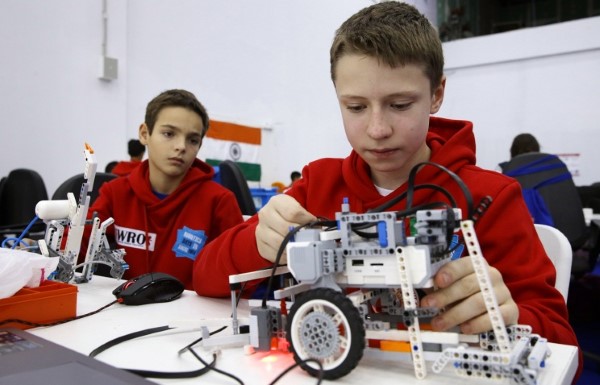The Russian Ministry of Education and Science will introduce per capita financing of school clubs in 2016, following which the supplementary school education system will gradually become threefold. It will be based on traditional after-school programs, clubs and schools (sports and music schools, etc.), as well as newly established technology parks for children.
Such was the Education Ministry’s response to the ongoing debate on the preferable model for supplementary school education, or after-school activities, as it used to be called. There are two predominant approaches to the problem. Some say that children should be busy all day until 7 p.m., while others argue that parents in 60 percent of Russian regions cannot pay for their children’s after-school activities in full.

This is why the Education Ministry has taken a step-by-step approach. As of today, over 65 percent of children aged 5 to 18 receive supplementary education, in a 7 percent increase from 2010. This is the type of supplementary education that will receive regulatory per capita financing, with one caveat: it will be voluntary. According to Vladimir Burmatov, First Deputy Chairman of the State Duma Committee on Education, who took part in drafting the corresponding normative act, schools have no obligation to organize extracurricular activities, while no-one but parents can decide how many hours children should spend at school. He also notes that additional education services would not appear as quickly as the Ministry expected: “Firstly, a significant number of schools operate in two, even three shifts. Secondly, there is a problem with after-school clubs. There are still about 15 regions where parents are charged substantial sums for after-school activities despite all the talks about reducing fees.”
However, Alexander Stradze, Director of the Department for State Policy in the Field of Education of Children and Youth at the Education Ministry, has a different opinion. Admitting that not everyone can afford supplementary education, he insists that the government guarantees for both classroom lessons and educational work should be implemented.
“This is our priority,” Alexander Stradze says, “which is why the supplementary education coverage will progressively expand to about 75 percent of schoolchildren across Russia by 2018.”
The Education Ministry is equally firm about the costs for supplementary education: they will increase through the federal budget and, most importantly, regional budgets. Svetlana Chupsheva, Director for Social Projects at the Agency for Strategic Initiatives, says that the Children’s Supplementary Education Concept, developed and adopted by the Ministry a year ago, offers new opportunities for parents and children alike “thanks to the possibility of tracking individual education paths and flexibility of supplementary education programs.”
The Concept is about developing both conventional and unconventional types of after-school programs, since the global technological progress poses serious challenges when it comes to children’s leisure activities. To wit: no more than 5 percent of today’s schoolchildren frequent science clubs.
“This negative trend prompted us to choose three regions for a project heavily promoting nanotech, biotech and information technologies among teenagers,” Ms. Chupsheva says. “I’m talking about Tatarstan, Khanty-Mansi Autonomous Okrug and Altai Krai. The first technology parks for children will be launched there in a year or two. They will advance the new, experimental model for supplementary education.”
Similar technology parks to the tune of 300 million roubles in total are being tested in Tatarstan. As of now, they have two focus areas—robotics and TD-modeling—which will soon be joined by biotech and nanotech. Meanwhile, two financing models—state and private—are employed in Tatarstan at the same time.
“People should be able to access high-quality supplementary education services, including those free of charge, through various frameworks and sources,” says Irina Abankina, Director of the NRU HSE Institute for Educational Studies. “There can't be a uniform framework in this complicated field. We need a combination of flexible and modern financial tools, which is impossible without consulting families, businesses and investors.”
Ms. Abankina believes that the problem of getting technology parks off the ground and developing them in the context of supplementary education goes beyond financing.
“We should realize that some of the allocated funds are wasted,” she says, “because there is no targeted approach. Today, Russian regions can sponsor supplementary education in municipalities thanks to Article 8 of the Education Law. But the sums are handed out through subsidies, without distinction. So when municipal authorities receive those mixed subsidies as if they were given sweets in a can, they can spend the money however they wish—for instance, on medicines or infrastructure instead of education. This is the problem we need to solve. If we don’t, the technology park initiative, as good as it is, will fail before it reaches most regions.”
Alexander Stradze agrees that “the regional framework for financing children’s technology parks is not robust enough.” For this reason, the Education Ministry assigned a special budget classification code to supplementary education initiatives. “We will bring this project to fruition,” Mr. Stradze says, “to show local communities the money spent specifically on supplementary education.”








